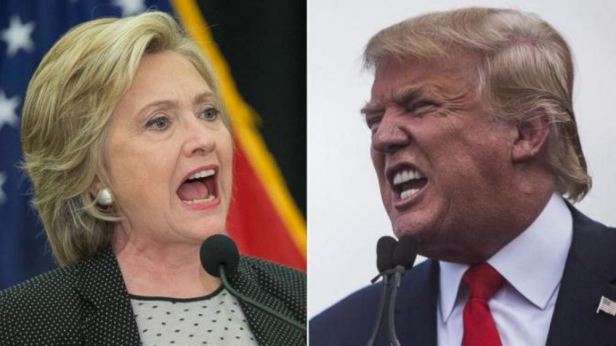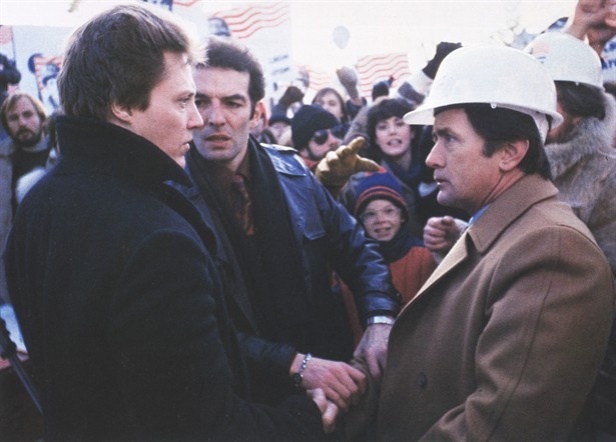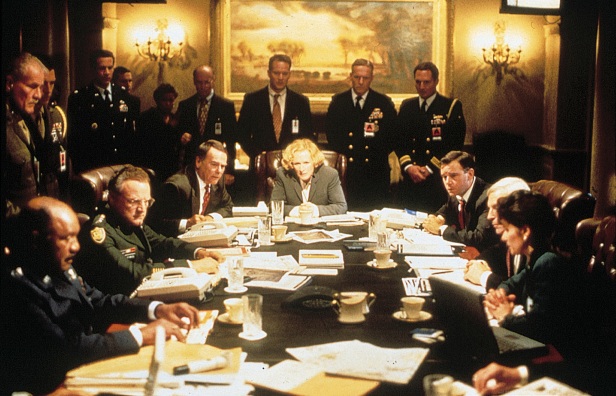
With only a short time left before the actual voting for and election of the next US President I have been expecting some enterprising exhibitor to offer a selection of the many films that feature this process. I know from experience how effective revisiting films that become topical can be. At the 2007 Il Giornate del Cinema Muto we had one of the last screenings in the D. W. Griffith programme: The Struggle (1931, a sound film). An opening sequence set in an open-air bar has a group of men discussing the state of the nation. One character opines to the effect that “we need a change of president.” This line was greeted by a roar of spontaneous approval from the rear of the auditorium, where it appeared many of the visitors from the USA were sitting. There are indeed many films that touch on US elections, some including a representation of a Presidential election : some featuring other US elections: and some where the road to the White House figures in some way. I thought it would be interesting to revisit the best or the most interesting. There are even some films that feature a US female president, and even more television dramas.
Gabriel Over the White House 1933
President Judson C. “Judd” (“Major”) Hammond (Walter Huston) is elected to tackle the country’s depression and international threats. His presidency marks him as an almost fascistic leader who makes Donald Trump look like a wishy washy liberal.
First Lady 1937
Washington in the throes of an election with Stephen Wayne (Preston Foster) running for Oval office. But the key player is his wife and perspective First Lady, Lucy Chase Wayne (Kay Francis). A comic take on politics and power.
Keeper of the Flame 1942
George Cukor directs. Spencer Tracy as journalist Steven O’Malley writing a biography of Robert Forrest, who, before his untimely death, was seen as a potential President. O’Malley seeks an interview with the widow Christine Forrest (Katherine Hepburn, the great partner with Tracy in innumerable films). As O’Malley investigates it becomes clear that Forrest was a fascistic leader planning to subvert US democracy. His untimely death has saved the nation.

State of the Union 1948
Frank Capra made several films that critique the Washington political class. In this production Spencer Tracy is would-be candidate Grant Matthews. Newspaper magnate Kay Thorndyke (Angela Lansbury, the mother in The Manchurian Candidate) backs him until he starts to utter what he thinks are home truths. When he withdraws and voices his views on public radio [just like Franklin D Roosevelt] the media attempt to silence him.
The Last Hurrah 1958
Mayor Frank Skeffington (Spencer Tracy) is running for re-election in a major city [Boston]. The election is an example of old-style Tammany Hall politics versus the new politics of media. In the character of his young opponent, Charles B. Fitzsimmons (Kevin McCluskey), there appears to be a satirical reference to an earlier US Presidential election. This is a John Ford film with a fine cast of veteran Hollywood actors.
The Best Man 1964
Two Presidential candidates, William Russell (Henry Fonda) and Joe Cantwell (Cliff Robertson) vie for the endorsement by the retiring President Art Hockstader (Lee Tracy). You can guess from the stars or the character’s names who is the good guy and who is the bad guy. The background of a Party Convention makes the film even more interesting. And the biting script by Gore Vidal is excellent.
The Manchurian Candidate 1964
This is the best of the two film versions of Richard Condon’s novel. The main plot point is an attempted assassination, but that is part of a wider conspiracy. The climax takes place at a Party Convention where Major Bennett Marco (Frank Sinatra, himself a would-be Presidential assassin in Suddenly, 1954) confronts Raymond Shaw (Lawrence Harvey). We get both the ‘red scare’ of the earlier decades and a candidate, Senator John Yerkes Iselin (James Gregory), who might be a relative of Donald Trump.
The Candidate 1972
Bill Mackay (Robert Redford) runs as a Democrat for a senatorial post in California. As the campaign develops he learns the reality of political contests in the USA.

The Dead Zone 1983
This was a novel by Stephen King, directed in a film adaptation by David Cronenberg. It would be the key movie for 2016. Johnny Smith (Christopher Walken) suffers an accident and then develops psychic powers. When he touches a person he sees and hears their secrets, past, present and future. The traumas of these powers turn Johnny into a recluse. He also asks himself the question, if he had touched Hitler and seen his future should he have killed him? This question takes practical form when he meets and touches Senatorial candidate [and a Presidential candidate to-be] Greg Stillson (Martin Sheen, playing the exact opposite of President Josiah Bartlett). When you see the film you will realise why it is so apt.
Dave 1993
David Kovic (Kevin Kline) is the ‘stand-in for President William Harrison Mitchell (Kevin Kline). The latter is another sexpot whose fortunate stroke turns David into the President [only short term]. He is a virtuous President, aided by wife and widow First Lady Ellen (Sigourney Weaver). An ingenious but implausible method for replacing a President.
The American President 1995
This film has Michael Douglas as President and widower Andrew Shepherd who, whilst courting lobbyist Sydney Ellen Wade (Annette Bening), worries with his chief of staff Lewis Rothschild (Michael J Fox) over his poll ratings and a future re-election. Director Rob Reiner and writer Aaron Sorkin offer an early version of what would become so successfully on US Television The West Wing’s President Josiah Bartlett. In fact Martin Sheen has a supporting role in the film as a confidante and ‘Chief Domestic Advisor’. Early on one character describes visiting the White House as ‘Capraesque’ and it is this sort of narrative essayed in the film. As a good Liberal and Democrat Andrew Shepherd wins his girl and beats down Republican Senator and sound bite purveyor Bob Rumson (Richard Dreyfuss).
Absolute Power 1997
President Alan Richmond (Gene Hackman) is another philandering leader, this time with the wife of his mentor Walter Sullivan (E. G. Marshall). His nemesis this time is high-tech cat burglar Luther Whitney (Clint Eastwood). Another example of Hollywood scriptwriters coming up with methods for disposing of undesirable commanders-in-chief.

Air Force One 1997
Whilst monogamous James Marshall (Harrison Ford) is off fighting terrorists, predictably led by Ivan Korshunov (Garry Oldman) Vice-President Kathyn Bennett (Glenn Close) gets to act as President for a few hours. We appear to be in a cycle of alternating Presidential personas – philanderer followed by virtuous type.
Primary Colours 1998
Governor Jack Stanton (John Travolta) is running for President, supported by his wife Susan (Emma Thomson). Stanton is also running to hide a sexual scandal. This thinly veiled dramatising of history is probably the movie that Hilary Clinton would least like to see re-released in 2016.
The Contender 2000
Senator Laine Hanson (Joan Allen) s a contender for US Vice President, but information and disinformation about her past surfaces in a way that threatens to de-rail her confirmation. She is no Hilary Clinton who presumably feels equally strongly about the invective directed against her. And we have in Shelly Runyon (Gary Oldman) someone who sounds like Donald Trump.
The Ides of March 2011
Stephen Myers (Ryan Gosling) is a ‘staffer’ in the Presidential campaign of Governor Mike Morris (George Clooney), Democrat. But his naive eyes are opened, both by the conduct of the candidate and the machinations of the party machines.
Independence Day: Resurgence, 2016
Yet to be seen, the return of an alien invasion sees a female President Elizabeth Lanford (Sela Ward). Plot Spoiler – she dies. Wish fulfilment by a Trump supporter?
